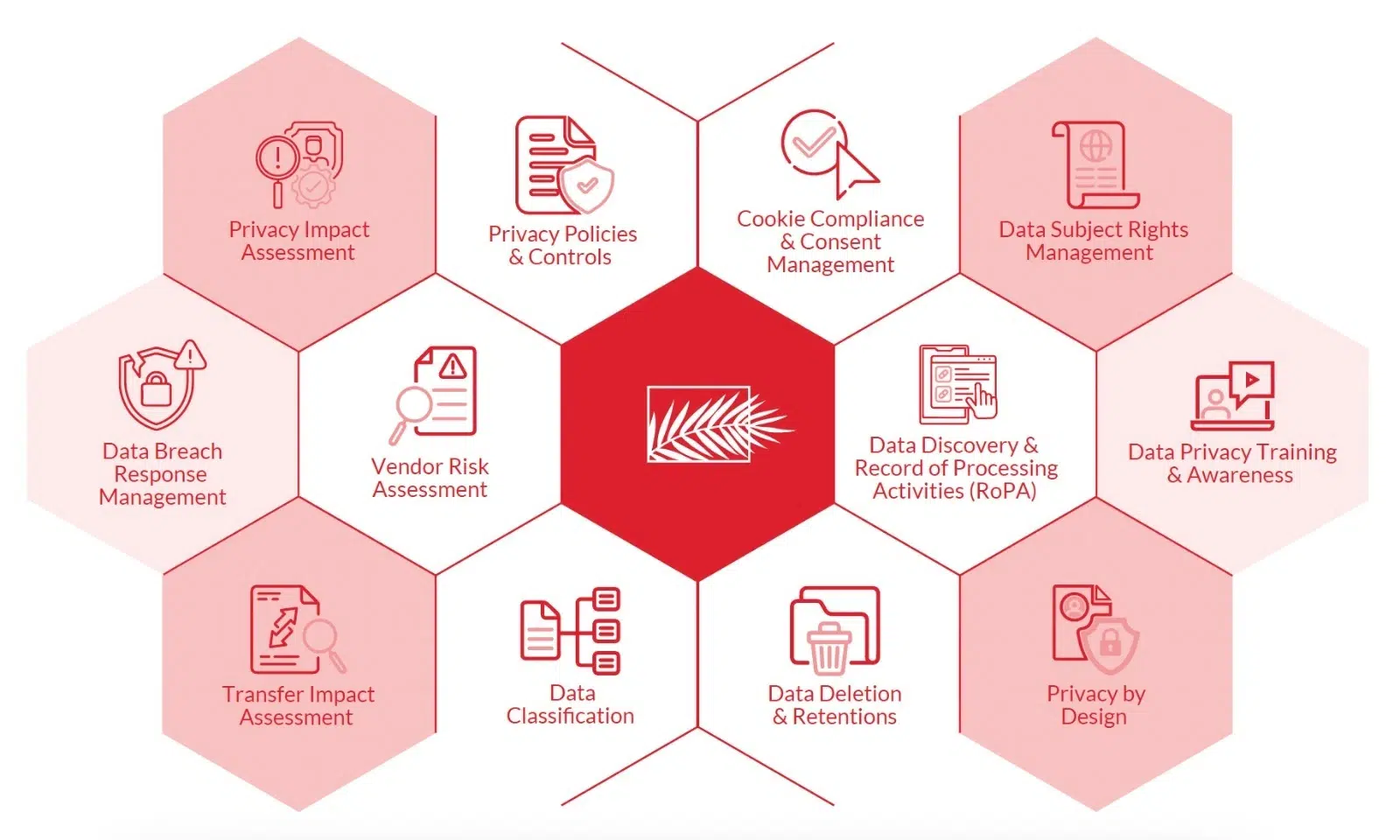Saudi Personal Data Protection Law (KSA PDPL) FAQs
Got PDPL questions? Get your answers.
Yes. Personal Data Protection Law (PDPL) compliance is mandatory for all entities processing the personal data of individuals in Saudi Arabia, regardless of whether you’ve received a direct notice.
Organizations are expected to proactively comply once the law is in force, so it’s best practice to align your data processing activities with PDPL requirements.
Any public or private entity (inside or outside KSA) that processes the personal data of individuals residing in Saudi Arabia must comply with the Personal Data Protection Law (PDPL).
This includes businesses of all sizes, government agencies, non-profits, and professional service providers.
Likely, yes. Even if you operate in a B2B context, you may still process personal data such as employee details, business point of contact (POCs), or personal data about partners and vendors.
If these individuals are in Saudi Arabia, PDPL obligations apply.
Absolutely. Employee data (e.g., names, salaries, national ID, performance evaluations) qualifies as personal data.
You need to meet PDPL’s requirements for transparency, security, retention, etc.
Not necessarily. Under KSA PDPL, a “Data Controller” is any entity determining the purposes and means of processing personal data.
Even if you don’t collect data via forms or websites, you might still receive or store personal data (e.g., from third parties, or affiliates).
Processors (entities that process data on behalf of a Controller) also have obligations under the PDPL, such as adhering to security requirements, following the Controller’s instructions, and assisting with data subject rights.
Both Controllers and Processors can be held accountable for non-compliance.
Not as a blanket rule. However, transferring data outside the Kingdom is regulated.
You must ensure the receiving jurisdiction has “adequate” data protection or obtain approvals/safeguards for cross-border transfers (e.g., Standard Contractual Clauses, Binding Corporate Rules).
Penalties include fines up to SAR 5 million, which can be doubled for repeated offenses.
Unauthorized disclosure of sensitive data can lead to up to 2 years imprisonment and/or a fine of up to SAR 3 million.
Illegal cross-border transfers can lead to up to 1 year in prison or a SAR 1 million fine.
If your organization’s core activities involve large-scale processing, systematic monitoring, or handling sensitive personal data, you must appoint a DPO.
This role can be filled by an internal employee or external consultant with data protection expertise and must be registered via the National Data Governance Platform.
Typically, you should obtain explicit, informed consent for direct marketing activities, unless another lawful basis applies (e.g., legitimate interest under strict conditions, or existing customer relationships with clear opt-out mechanisms).
PDPL allows data erasure requests, but legal obligations or regulatory requirements can override them.
You must balance the individual’s request against mandatory retention periods.
If legally required to keep the data, document the relevant legal basis and communicate this to the data subject.
Absolutely. As a Data Controller, you remain responsible for ensuring that any third-party processors or service providers adhere to PDPL standards.
This typically involves conducting due diligence, putting data protection clauses in contracts, and monitoring vendors’ compliance.
Yes. While GDPR compliance provides a robust foundation, you must still meet the specific local requirements of the PDPL such as Saudi-specific:
- breach notification timelines
- potential registration obligations
- cross-border data transfer rules
- etc.
A transfer of personal data from inside KSA to a location outside KSA.
PDPL imposes conditions on such transfers, often requiring a Transfer Impact Assessment (TIA), contractual safeguards, or SDAIA approval under certain circumstances.
Typically within 72 hours of becoming aware of a breach that could pose a serious risk to data subjects.
Depending on the severity, you may also need to notify affected individuals promptly.
Most organizations processing personal data in their core activities, especially if it’s sensitive, must register with the competent authority.
“Small scale” alone doesn’t guarantee exemption, verify whether your data activities trigger registration requirements.
PDPL is the main law for personal data protection. However, industry-specific regulations (e.g., healthcare, finance) might impose additional or stricter rules.
In case of conflict, consult legal experts to determine which obligation prevails or how best to comply with both sets of requirements.
Yes. PDPL applies to personal data whether it is processed electronically or in other forms.
If you hold personal data in physical files and you organize or process it systematically, PDPL requirements, like secure storage and proper retention still apply.
PDPL requires DPIAs for certain high-risk processing, especially involving sensitive data, large-scale data, or technologies that could impact individuals’ privacy.
Best practice is to embed DPIAs into your project lifecycle whenever privacy risks are significant.
Yes. Any data that can directly or indirectly identify an individual, this can include device identifiers, IP addresses, or cookie data, can be considered personal data.
Your organization must handle such data in compliance with PDPL.
The Saudi Data & Artificial Intelligence Authority (SDAIA) publishes regulations, FAQs, and resources on its official platforms.
Regularly check for new rules, including adequacy decisions for cross-border transfers.
If data is truly anonymized such that no individual can be re-identified, it typically falls outside the scope of PDPL.
However, pseudonymized data can still be linked back to an individual with additional information, so it’s generally treated as personal data. Use robust anonymization methods where appropriate.
Yes, if you act as a Controller and can identify the individuals in the data, you must ensure transparency.
Even if the data initially came from a third party, you have obligations to provide or make available a privacy notice describing the processing and rights.
Collaborate with your data sources to ensure compliance.
Maintain compliance documentation such as:
- Records of Processing Activities (ROPA)
- Data Protection Impact Assessments (DPIAs)
- Privacy and security policies
- Breach response logs
- Training records
Regularly audit your processes and, where necessary, register or notify the competent authority.
Saudi Personal Data Protection Law Compliance Services (KSA PDPL)
PDPL Compliance Implementation
Achieve PDPL Compliance in 4 weeks or less.

Personal Data Protection Officer As A Service (DPOaaS)
Let us handle your daily PDPL Compliance Operations.

PDPL Compliance Audit (External)
Audit your PDPL compliance obligations.

Saudi PDPL Compliance in 4 Weeks ↓
Click the button below to start your PDPL Compliance journey, stay prepared for SDAIA audits, and eliminate the risk of enforcement actions.

4 Weeks Saudi PDPL Compliance Sprint (KSA PDPL)
Hala Privacy offers a focused 4-week PDPL Compliance sprint for Small & Medium Enterprises (SMEs). Unlike other consulting firms, we don’t outsource or inflate costs. Our in-house PDPL Experts, Consultants, and Legal Counsel deliver compliance through on-site discovery, workshops, policy implementation, and structured, audit-ready documentation.
We handle everything: Data Controller Registration, DPO Assignment, RoPA, Legal Basis, Privacy Notice, DSR, DPA, DPIA, TIA, SCC, BCR, Cookies & Consent, Breach Readiness, Training, etc., ensuring SDAIA aligned PDPL Compliance.
Understand Your PDPL Compliance GAPs
Join our 30-minute PDPL workshop designed to help Saudi SMEs quickly assess how the Personal Data Protection Law (KSA PDPL) impacts your business and where you are at risk of non-compliance.
What you’ll gain:
✅ A quick GAP analysis aligned with SDAIA PDPL regulations
✅ Clarity on required data protection controls and documentation
✅ Insights in legal obligations for data collection, processing & sharing
✅ Roadmap to build a sustained PDPL-compliant privacy framework
✅ Expert PDPL guidance tailored to your business size and sector
Avoid penalties. Stay compliant.



About Hala Privacy
We simplify Saudi Personal Data Protection Law (SDAIA KSA PDPL) compliance, making it manageable for businesses. We help you navigate regulatory changes effortlessly, turning data privacy chaos into compliance.
With us, you get it done in weeks—not months—so you can focus on growing your business without worrying about compliance.

Saudi Personal Data Protection Law Compliance Implementation Sprint (KSA PDPL)
Total compliance with the Personal Data Protection Law, Implementing Regulation, and SDAIA Guidelines.
What we do:
A focused 4-week PDPL Compliance implementation sprint to achieve your PDPL compliance baseline.
Led by our in-house data privacy experts and legal counsel, delivered directly, and built around your real data, people, and systems.
Who is it for?
For small to mid-sized enterprises (SMEs) ready to kick off the PDPL compliance journey and gain a competitive advantage.
What you get:
No outsourcing. No subcontractors. No remote handoffs. Each PDPL Compliance Artefact is delivered by Hala Privacy’s core team in KSA.
On-Site Discovery & Compliance Workshops to Develop Your RoPA
We work directly with your teams to understand internal processes, data flows, systems, and third-party relationships. Then, map your personal data landscape, assess compliance gaps, and align processes with PDPL and SDAIA regulations. Finally, we build your Record of Processing Activities (RoPA) in compliance with PDPL Article 31 and Implementing Regulation Article 23(1).
End-to-End PDPL PDPL Compliance Implementation
We implement the full PDPL baseline with you: Data Controller registration, DPO assignment, RoPA development, Legal basis mapping, Privacy notices, DSR workflows, DPIAs, TIAs, Cross-border transfer safeguards (SCCs/BCRs), and Breach readiness. Every requirement under the PDPL Law and Implementing Regulations is fully delivered.
SDAIA Audit-Ready PDPL Evidence Pack
We prepare you with structured, indexed documentation across all required domains: RoPA, policies, logs, registers, workflows, and assessments aligned with PDPL Legal Requirements, Implementing Regulation Procedural Requirements and SDAIA 2025 Compliance Guidelines, so your business is not only compliant but prepared, protected, and audit-ready.
Knowledge Transfer & Operational Readiness
We train your teams, transfer all knowledge, and equip you with operational readiness: Handling DSRs within 30 days (PDPL Article 17), Managing breaches within 72 hours (PDPL Article 20), Maintaining compliance logs (Implementing Reg Article 23–24). Your staff walks away with practical knowledge, not just documentation, ensuring long-term internal ownership and regulatory confidence.
Pricing Tiers:
Based on company size, processing volume, risk exposure, complexity, internal scale, and system scope.
Light Footprint, Less than 250 Employees
SAR 123,456
Moderate Complexity, 250-500 Employees
SAR 123,456
High-Risk, 500-1000 Employees
SAR 123,456
Enterprise, 1000-3000 Employees
SAR 123,456
Hala Privacy turned our PDPL compliance into growth.
A focused 4-week PDPL Compliance implementation sprint to achieve your PDPL compliance baseline.
Led by our in-house data privacy experts and legal counsel, delivered directly, and built around your real data, people, and systems.

Eng. Muaffaq Mobarah
CEO, Othaim Markets
MODON is compliant with PDPL.
By partnering with Hala Privacy, MODON complied with personal data protection laws, confidently protects our stakeholders’ personal data, and supports a secure, innovative business environment, driving Kingdom’s vision for a sustainable economy.

Majid Bin Sawad
CISO, Saudi Authority for Industrial Cities and Technology Zones
Hala Privacy made it easy for us to meet PDPL & SAMA requirements.
Their proactive approach and ongoing support fueled our digital finance innovation while seamlessly managing our data privacy compliance turning a daunting journey into a smooth process.

Mokhtar Al Somali
CISO, Loop - Digital Payment Company
Hala Privacy helped Gathern | جاذر إن quickly adapt to PDPL requirements.
Their hands-on approach and consistent follow-up gave us the confidence to protect our customers’ data and focus on delivering the best in hospitality.

Ahmed Alnaim
GRC & Legal Director


